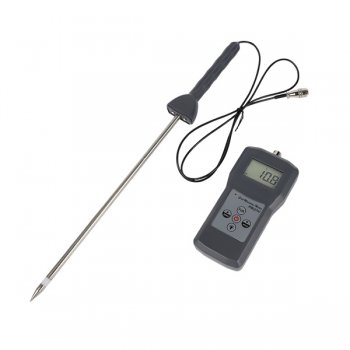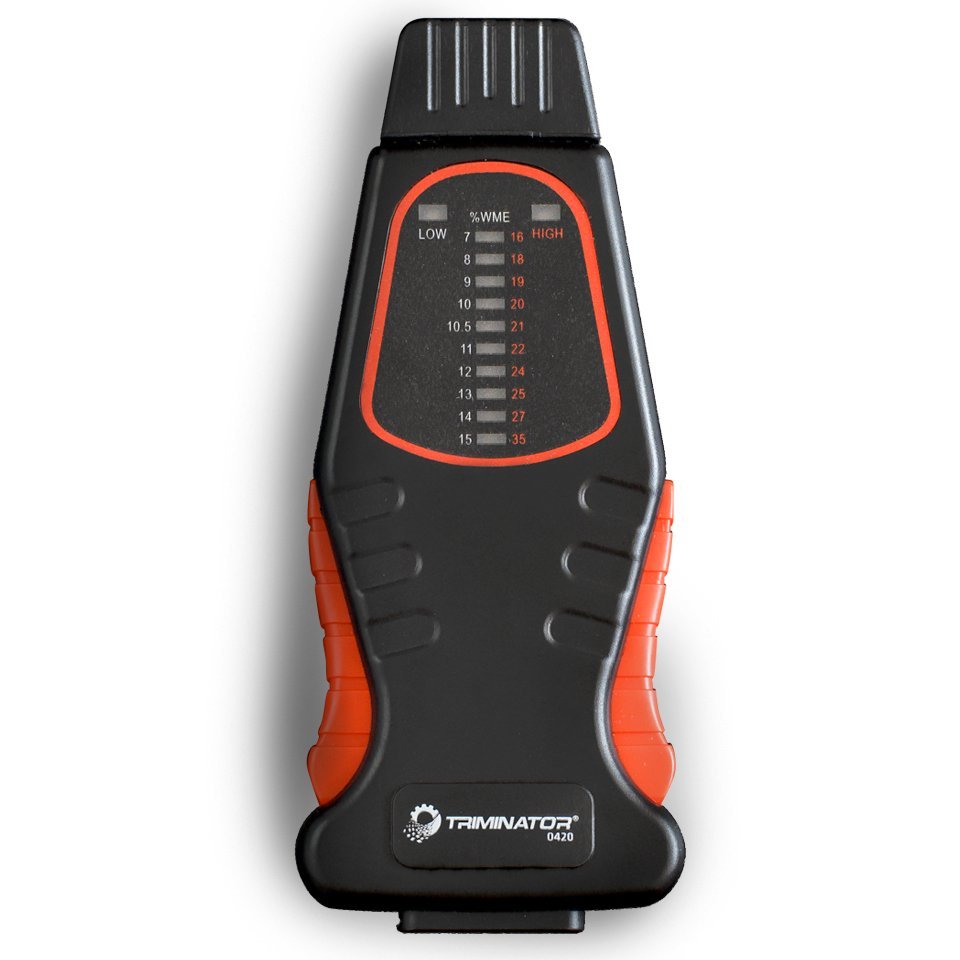The Ultimate Overview to Moisture Meters: A Comprehensive Summary and Just How They Can Save You Cash
Moisture meters offer as essential devices in detecting and checking moisture web content in materials, assisting in avoiding costly damages and making certain the quality of products. Comprehending the subtleties of various kinds of moisture meters, their applications, and the prospective cost-saving benefits they supply can be a game-changer for services and experts alike.
Kinds of Wetness Meters
Numerous kinds of moisture meters are readily available for different applications in different markets. One usual type is the pin-type dampness meter, which determines the electric resistance between 2 pins placed into a product. This type appropriates for wood, drywall, and various other structure materials. Pinless dampness meters, on the other hand, usage electro-magnetic sensor plates to scan a larger area without creating damages to the material's surface area. Moisture Meter. These meters are perfect for quickly evaluating moisture levels in huge areas such as walls and floorings.

In addition, there are likewise specialty moisture meters developed for specific materials like grain, hay, or soil. These meters supply accurate moisture readings tailored to the special properties of the product being examined. Infrared moisture meters gauge the thermal residential properties of a product to establish its wetness content non-invasively, making them valuable for applications where pin or pinless meters may not appropriate. Comprehending the different kinds of dampness meters available can help sectors choose one of the most proper tool for their certain dampness dimension needs.

Benefits of Making Use Of Moisture Meters
Dampness meters offer important advantages in properly evaluating and keeping an eye on moisture degrees in diverse products and environments. One of the key benefits of making use of dampness meters is the prevention of prospective damages created by excess wetness.
Moreover, making use of dampness meters can result in boosted energy performance. By determining areas with high wetness degrees, such as leakages or bad insulation, changes can be made to improve power conservation and minimize utility expenses. In agricultural settings, wetness meters play a vital role in enhancing crop yields by allowing farmers to check dirt dampness levels and make educated watering choices. Generally, the benefits of making use of dampness meters cover across various industries, offering affordable services and promoting much better high quality control methods.
Exactly How to Choose the Right Dampness Meter
Picking the ideal moisture meter includes considering crucial elements such as material compatibility, measurement array, and calibration accuracy. When choosing a moisture meter, it's vital to guarantee that the meter appropriates for the certain product you will certainly be testing. Different products have varying electric residential or commercial properties that can impact moisture analyses, so selecting a meter developed for your material is important for accurate outcomes. Furthermore, consider the dimension variety of the wetness meter. Make certain that the meter can detect click now moisture degrees within the variety needed for your applications. Calibration accuracy is another crucial factor to remember. Go with a wetness meter with trustworthy calibration to ensure accurate and regular analyses. Some meters may call for routine calibration changes, so comprehending the calibration procedure is necessary. By meticulously examining these elements, you can select a wetness meter that fulfills your requirements and provides precise wetness dimensions for your jobs.
Correct Methods for Moisture Meter Use

Price Financial Savings Via Moisture Meter Applications
Just how can the calculated use of wetness meters lead to substantial cost savings throughout various markets? Dampness meters play an important duty in cost financial savings by stopping possible damages and ensuring quality control in various markets. In the farming sector, moisture meters aid in determining the optimal time for gathering crops, avoiding excess or over-drying dampness that can affect the final item's top quality. This accurate monitoring helps farmers avoid unneeded losses and maximize their return.
Similarly, in building, moisture meters help protect against costly problems by detecting wetness degrees in structure materials, such as timber or concrete, which can result in architectural why not find out more concerns otherwise addressed quickly. By recognizing problem locations early, service providers can take restorative measures to prevent substantial fixings or replacements, ultimately saving money and time.
In addition, in the food handling sector, wetness meters are important for keeping track of product quality and making sure compliance with safety and security laws. By properly measuring dampness web content in food products, makers can protect against spoilage, maintain quality, and lower waste, leading to substantial cost financial savings. Overall, the tactical application of wetness meters is a valuable investment that can result in significant price decreases and boosted effectiveness across various markets.
Conclusion
In final thought, moisture meters are valuable tools for determining and detecting wetness degrees in numerous products. By using the right moisture meter and adhering to correct strategies, users can properly protect against pricey problems triggered by check out here excess wetness.
Dampness meters offer as indispensable tools in identifying and monitoring moisture web content in materials, assisting in avoiding costly damages and guaranteeing the high quality of items. Infrared wetness meters measure the thermal properties of a product to identify its wetness content non-invasively, making them useful for applications where pin or pinless meters may not be ideal.Wetness meters provide vital benefits in properly monitoring and evaluating moisture degrees in varied products and atmospheres. In farming setups, wetness meters play an important duty in optimizing plant yields by making it possible for farmers to keep track of soil dampness levels and make notified irrigation choices.In final thought, dampness meters are beneficial tools for measuring and discovering moisture degrees in various products.